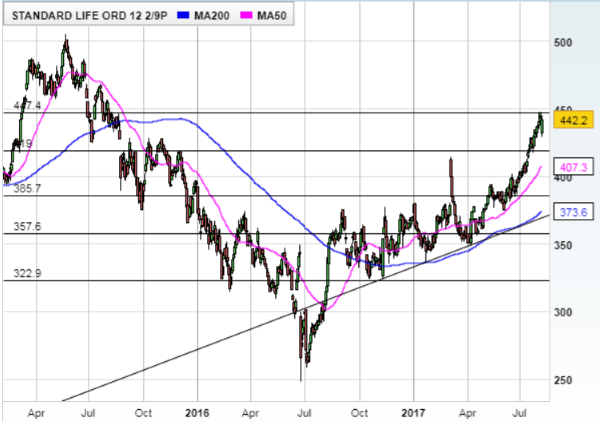Rush for exit topples Standard Life from two-year high
8th August 2017 13:58
by Graeme Evans from interactive investor
Share on
Just days before is due to complete its £11 billion merger with , the Edinburgh-based firm continues to find that the performance of its absolute returns fund is still grabbing the headlines.
Like many other funds of this type, Standard is paying the price for a weak investment showing in 2016, resulting in outflows for its GARS product of £5.6 billion in the first six months of this year.
The £23 billion fund, which aims to provide a positive investment performance whatever the market conditions, is the biggest of its kind in the UK. The multi-asset GARS has an investment remit to target a level of return over rolling three-year periods equivalent to cash plus 5% a year.
The GARS performance resulted in outflows for Standard Life of £3.7 billion in H1, with gross inflows of £20.7 billion more than offset by redemptions of £24.4 billion. Assets under administration increased by 1% to £362 billion.
The merger with Aberdeen Asset Management, which is due to complete on Monday, will help the two companies deal with the growing threat from passive investing, where lower cost rivals track a market-weighted index or portfolio.
It will also broaden Standard's investment capabilities in areas such as emerging markets equities and debt, quantitative solutions and alternatives. There will also be £200 million a year of savings.

The combination will mean that Standard, which was once Scotland's largest life assurance company, will no longer be classified for investment purposes as an insurer. From Monday, Standard Life Aberdeen will be found within the diversified financials sector.
This will mark the end of the road for coverage by Panmure Gordon's Barrie Cornes, who signed off today by again expressing his scepticism about the benefits of the merger deal for Standard Life investors.
He said: "We maintain our cautious stance towards the union given our previously flagged concerns particularly concerning the management structure."
His comments reflect the combined entity's co-CEO structure, with Standard Life's chief executive Keith Skeoch working alongside Aberdeen counterpart Martin Gilbert, who in the space of 34 years turned the asset management business from a single investment trust into one worth £3.8 billion.
The merger will see Aberdeen shareholders end up with 33% of the combined business. Standard Life ended its mutual ownership in 2006 and now has around 1.2 million shareholders.
Its shares have rallied more than 50% since the end of June in anticipation of the consolidation. UBS analyst Colm Kelly said today's results were slightly better than expectations, with half-year operating profits of £362 million up 6% on a year earlier. The 7p interim dividend was up 8%.
Aside from the net outflows caused by GARS, chief executive Skeoch highlighted that fee-based revenues were up 5% to £836 million in the half year. There was also an increase of 32% in net inflows into other growth channel products to £5 billion.
He said the merger would create a "diversified world-class investment company", adding that the combined leadership team had been "working well together to ensure Day 1 readiness".
This article is for information and discussion purposes only and does not form a recommendation to invest or otherwise. The value of an investment may fall. The investments referred to in this article may not be suitable for all investors, and if in doubt, an investor should seek advice from a qualified investment adviser.